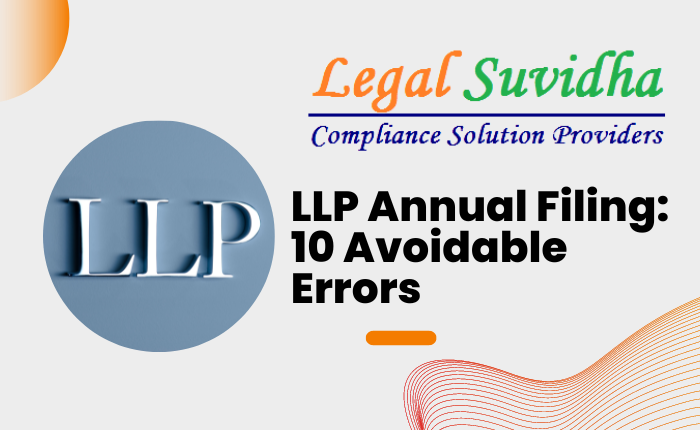The annual filing of Limited Liability Partnerships (LLP) in India holds great significance as it encompasses a vital compliance requirement. All LLPs operating in the country are obligated to submit their annual returns by the specified due date, failure of which may result in penalties. This mandatory filing process entails the submission of crucial financial documents, such as financial statements, balance sheets, profit and loss accounts, tax audit reports, and auditor’s reports, to the Registrar of Companies (ROC) under the Ministry of Corporate Affairs (MCA). It is of utmost importance for LLPs to complete their annual filing accurately and punctually in order to avoid any potential penalties or legal complications.
In this blog post, we will explore the common mistakes to avoid when submitting LLP annual returns.
Neglecting to File Returns: One prevalent and avoidable error is failing to submit LLP annual returns on time. Limited Liability Partnerships are required to file their annual returns within 60 days from the end of the financial year. Late filing can result in a penalty of Rs.100 per day, with a maximum penalty of Rs.5,000. It is crucial for LLPs to file their annual returns promptly to prevent penalties and legal complications.
Inaccurate Financial Statements: LLPs must prepare their financial statements in accordance with the provisions of the LLP Act and the Indian Accounting Standards. Inaccurate financial statements can lead to significant legal issues and penalties. Limited Liability Partnerships should ensure that their financial statements are precise, up-to-date, and compliant with the LLP Act and Indian Accounting Standards.
Insufficient Information: Providing incomplete information is another common mistake when submitting LLP annual returns. LLPs should guarantee that all information included in the annual returns is complete and accurate. This encompasses partner details, changes in partner information, the LLP agreement, and other relevant information.
Non-Compliance with LLP Agreement: LLPs must adhere to their LLP agreement when filing their annual returns. This entails submitting any modifications made to the LLP agreement during the financial year. Failure to comply with the LLP agreement can result in legal complications and penalties.
Inaccurate Partner Details: Incorrect partner details can lead to the rejection of the LLP annual filing. LLPs should ensure that all partner information is accurate and up-to-date. Any changes in partner details should be updated in the LLP agreement and submitted to the Registrar of Companies (ROC).
Erroneous Tax Audit Report: LLPs with a turnover exceeding Rs. 40 lakhs or a contribution surpassing Rs. 25 lakhs are required to have their accounts audited by a chartered accountant. An incorrect tax audit report can result in severe legal issues and penalties. LLPs should ensure that their tax audit report is accurate and complies with the provisions of the Income Tax Act.
Non-Submission of Compliance Certificate: LLPs must include a compliance certificate with their annual returns. The compliance certificate should be certified by a chartered accountant or a company secretary. Neglecting to submit the compliance certificate can lead to penalties and legal complications.
Non-Submission of Auditor’s Report: LLPs must submit an auditor’s report along with their annual returns. The auditor’s report should be certified by a chartered accountant. Failing to submit the auditor’s report can result in penalties and legal complications.
Incorrect Digital Signature: LLPs must use a valid digital signature to sign their annual returns. An incorrect digital signature can lead to the rejection of the filing. Limited Liability Partnerships should ensure that the digital signature used for signing the annual returns is valid.
Non-Compliance with Due Dates: LLPs should adhere to the specified due dates for filing annual returns. Any delays in filing can attract penalties and legal complications. LLPs should ensure that they possess all the necessary documents and information required for filing their annual returns well in advance.
In summary, this blog has examined the typical mistakes that should be avoided when submitting annual returns. It is crucial for LLPs to pay attention to these errors and guarantee the accurate and timely filing of their annual returns. Failure to do so may result in severe legal consequences and penalties. LLPs must adhere to the regulations outlined in the LLP Act and the Indian Accounting Standards to ensure their annual returns are filed correctly.
If You have any queries then connect with us at [email protected] or [email protected] & contact us & stay updated with our latest blogs & articles


![Received an Income Tax Notice in India? Don’t Panic — Here’s Exactly What to Do [2025 Guide] 1 Income Tax Notice](https://legalsuvidha.com/wp-content/uploads/2025/12/Income-Tax-Notice.png)
![Cyber Crime FIR in India: How to File Complaint for Online Fraud, Banking Fraud & Digital Harassment [2025 Guide] 2 Cyber Crime Complaint](https://legalsuvidha.com/wp-content/uploads/2025/12/Cyber-Crime-Complaint.png)
![Trademark Infringement in India: How to File Legal Action & Protect Your Brand [2025 Guide] 3 Tradenark Infrigement](https://legalsuvidha.com/wp-content/uploads/2025/12/Tradenark-Infrigement.png)
![Property Title Verification in India: How to Check Clear Title in 7 Steps [Avoid Property Fraud – 2025 Guide] 4 Property Titles Verification](https://legalsuvidha.com/wp-content/uploads/2025/12/Property-Titles-Verification.png)



